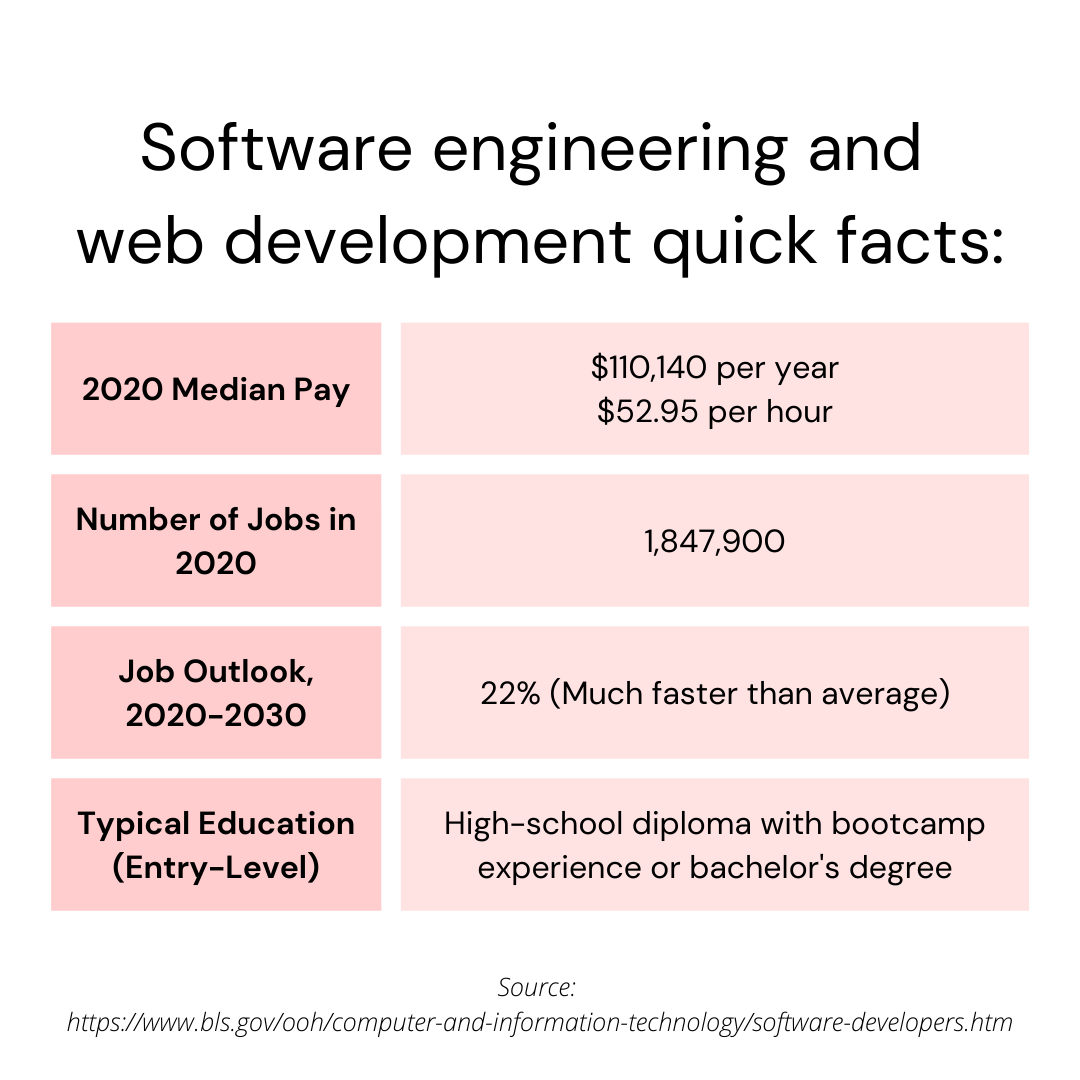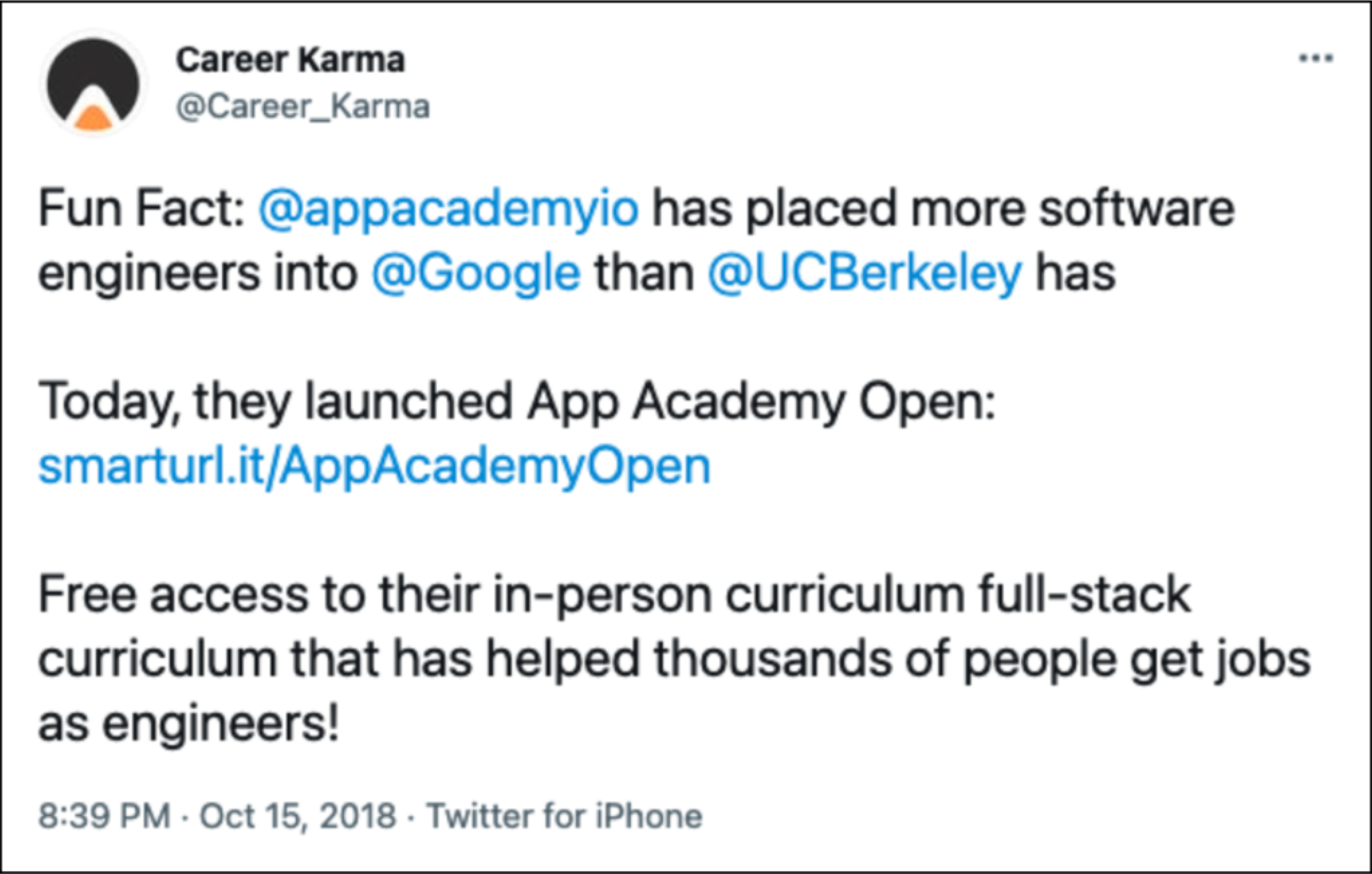Our lives are surrounded by computer code, whether we realize it or not. Work, home, and school have all shifted to increasingly digital models that rely on apps, programs, and software to get us through our days. And the digital revolution is growing by leaps and bounds!
If you dream of becoming one of the many successful coders or computer programmers who helps connect the people of today to the technology of tomorrow, a free online coding bootcamp may be right for you.

What is a Coding Bootcamp?
Bootcamps are intense and concentrated educational opportunities. Unlike other online classes that you may or may not be taking in pursuit of a degree, coding bootcamps take less time and they tend to be more affordable alternatives to online degree courses. Bootcamps allow learners to focus on the skills and training they need without a lot of fluff.
Coding bootcamps teach programming languages such as Ruby on Rails, Python, and JavaScript. You also learn other skills needed for a job in coding or programming, such as computer science, web development, back-end engineering, and front-end engineering. Some bootcamps are designed for absolute beginners looking to start a new career in coding or programming, while others are aimed at intermediate to advanced users who want to hone their skills or take the next step on their career path.
AppAcademy’s coding bootcamps concentrate on full-stack engineering and the most important coding languages you need to know now. They’re designed to help you get the most out of learning to code on your own time and at your own pace.
What to Look for in a Coding Bootcamp — Even a Free One
Not all coding bootcamps are the same. Before signing up for one, or downloading a curriculum for free, make sure you feel confident that you’ll get the most out of your bootcamp. Your time is valuable, so make sure you spend it learning with a bootcamp that will give you what you need, especially if you are a beginner.
Curriculum
Not all coding bootcamps teach the same skills or programs. Are you looking for a career in game development, cybersecurity, financial coding, systems analysis, or something else entirely? Depending on what you want to do with your new coding career, you’ll need to learn the skills that match.
Teaching Method
Some online coding bootcamp classes are synchronous (they set the schedule and you need to show up), while others are asynchronous (take the classes at your leisure). Choose one that works with your schedule and self-discipline.
Instructors
To get the most out of your free online coding bootcamp, you need to learn from the best. This means finding out who the instructors are and doing a little research. Choose bootcamps that have instructors with plenty of experience and/or certifications in the specific areas you’re interested in learning. And make sure the instructors or administrators will be available to answer your questions.
Time Commitment
Coding bootcamps can take days, weeks, or even months to complete. The more skills you want to learn, the longer your bootcamp may take. Remember that you need time to practice and develop your new skills when considering how much of a commitment you’re able to make.
Reputation
What all these traits have in common is reputation. When it comes to finding the best free online coding bootcamp for yourself, there’s no substitute for a program with a solid reputation. Look for online reviews based on metrics like job placement success and recent, verified student and alumni feedback.

The 11 Best Free Coding Bootcamps Online
Finding the best free coding bootcamp doesn’t have to take up all your time. We’ve collected some of the best programs available so you can browse your options quickly.
11. MIT Opencourseware
Massachusetts Institute of Technology (MIT) is one of many schools that offer free courses on a number of different subjects; naturally, this acclaimed technology university has a range of courses around computer science, programming languages, and algorithms.
While a few courses are designed for complete beginners, others require some prior experience or understanding. There are even some courses designed only for advanced, experienced engineers. The idea of MIT’s Opencourseware is not necessarily to help you find employment in a particular field, but rather to continue learning and broadening your understanding of different subjects.
It’s also important to note that not all of these programs are necessarily up-to-date with what’s currently practiced or popular in the rapidly changing world of tech. For example, MIT’s Introduction to Computer Science and Programming in Python is the curriculum that was taught during the Fall 2016 semester.
10. Harvard University
MIT’s equally prestigious neighbor, Harvard, is another institution that offers a selection of free courses in programming, game development, and even computer science for law students. The school offers one introductory programming course that takes approximately 3 weeks to complete, then sends the learner off for other, more advanced courses that narrow the focus on a particular skill or idea, like data science or app development.
Much like MIT’s Opencourseware, those hoping to land a job as a software engineer may want to look elsewhere or combine efforts with another, more robust program. One strong point: Harvard does offer certifications for completing their courses, you just have to pay for it.
9. Udemy
Udemy offers a wide range of paid and free classes that aren’t necessarily specific to coding and programming, but they’re short and provide a decent starting point if you want to see what’s out there. This can be great if you’ve never written code before and want a quick overview of, say, Python for free before committing to a bootcamp.
You can access their videos wherever you want thanks to the Udemy app, the classes offer downloadable resources for you to keep, and you do earn a certificate of completion. However, many of their classes, even the super-short ones, aren’t free. And because they offer so many classes across dozens of fields, you’ll need to do a little digging through the search filters to find what you’re looking for. Even if you pay for classes, Udemy doesn’t offer job placement or alumni services.
8. Coursera
Coursera doesn’t create its own proprietary material; instead, they compile courses from colleges, universities, and companies directly. For example, you can become certified in Google-specific tools and processes, or you can earn a certification from the University of Michigan in a particular subject.
Much like Udemy, they offer a lot of courses across a broad range of subjects. While there are hundreds of free courses in data science, IT, engineering, and computer science, you’ll still need to assemble your own learning path. And while Coursera offers virtual feedback to help you hone your interview skills for potential jobs, they don’t help you find those jobs.
7. Khan Academy
Another large database of courses in everything from K-12 studies to life skills and economics, Khan Academy’s mission aligns closely with that of App Academy Open, which is to provide high-quality access to education for people around the world.
They offer 3 One Hour of Code” lessons that include Drawing with Code




